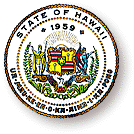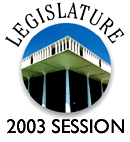
Lingle seeks As the Legislature goes into its final four weeks, Gov. Linda Lingle is appealing to the public to help push through education and public ethics bills she supports but which are now stalled.
support for
stalled measures
The governor asks the public
Gov pushes tourism summit
to push for her bills
to halt state corruptionBy Richard Borreca
rborreca@starbulletin.comIn an interview yesterday, Linda called for increased public pressure to lobby the Legislature to break up the single state school board and to reform state ethics laws.
"I introduced bills to stop public corruption, and those bills are not doing well," Lingle said.
"Right now their (the Legislature's) actions are that they don't really want to stop public corruption.
Legislature Directory
Legislature Bills & Hawaii Revised Statutes
"Also, their actions show they don't want to reform the public school system," Lingle said.
So far, Lingle, a first-term Republican governor facing a Democratic majority in the House and Senate, has been careful to not publicly challenge the Legislature.
She is changing tactics by calling for increased public support for her programs.
"I am still optimistic about this session. I am very disappointed about the reforms in education, but I think the public's opportunity to have an impact is immense and I want them to know it," Lingle said.
After campaigning on the issue of public ethics, Lingle introduced legislation to ban elected officials from collecting retirement or health benefits if they are convicted of a felony related to their work.
The bill has since been changed to call only for the convicted officials to lose their positions.
House Majority Leader Scott Saiki said the governor is not correct in saying the Legislature does not want to stop public corruption.
He said House Bill 287, Senate Draft 2, provides for termination of a public employee if they are convicted of a felony arising from their duties.
Under current law a public official is terminated upon sentencing.
He said there are also constitutional issues with taking away a state employee's vested benefits.
"The public should really look at what the governor does and not what she says," Saiki said.
Another administration bill would ban officials from taking any gifts worth more than $200. That bill also was killed.
"Just reporting gifts doesn't solve the problem. It is clear we need an anti-bribery bill, and it is not going anywhere," Lingle said.
Lingle is also worried that her push to break up the single statewide school board into seven separate districts is failing.
Changing the structure of public education, Lingle insists, is more important than spending more money for education.
"There fundamentally has to be changes between the communities and the schools. The decision-making has to be brought to a local level. It is not just about money," Lingle said.
One of the institutions blocking the changes, according to Lingle, is the Hawaii State Teachers Association, which she said has a lot of influence with legislators and no interest in real school reform.
HSTA Executive Director Joan Husted said last night that the union has never testified against Lingle's bill.
"I am a little surprised that the governor would see us as actively opposing and working against her reform of the school board," she said.
"The governor has never spoken to the president (Karen Ginoza) or myself about her bill," Husted added.
She said the union has questions about reform measures and says that before it can support any change in school governance, it needs those questions answered.
A bill now moving in the Senate would allow the public to vote on a constitutional amendment that would permit the Legislature to change the structure of the school board. Lingle dismissed that proposal, saying the people should have the option of simply voting on a constitutional change to the school board system.
Lingle added that because the House approved a bill last year calling for separate school boards, the public is confused why the Legislature has failed to support it this year.
"They clearly don't want the public to decide this issue," Lingle said.
Finally, Lingle said she feels the state's economy is on track in spite of the war with Iraq and that there is no need for a special legislative session this summer.
Legislators have discussed the possibility of reconvening later this year to pass economic stimulation measures similar to what was done after the 2001 terrorist attacks in New York and Washington. At that time the Legislature and the governor extended tax credits, forgave money owed the state by airport concessionaires and extended unemployment compensation.
Lingle, however, says that is not needed as long as the Legislature goes along with her recommended changes to the state's high-tech investment tax credit bill, Act 221. The changes are estimated to save the state about $55 million a year, according to her administration.
"Right now the House is really dug in on this issue. ... They think it shows them as being pro-business, but most of the business community has concerns about the way the act is structured."
Saiki said the governor targeted only the research and development portion of the tax credit law. He said there are other credits that may warrant additional scrutiny.
"At this point the House doesn't want to pick and choose," Saiki said.
Lingle said, "Those who are not in technology don't understand why this windfall is being handed to just one segment of the economy."
BACK TO TOP |
Gov. Linda Lingle is calling for a tourism summit meeting later this month because she says Hawaii's leading industry needs to think big. Governor pushes
for tourism summitBy Richard Borreca
rborreca@starbulletin.comIn an interview yesterday, Lingle said the tourism industry should focus on plans for the future and for growth.
"I wanted to share my observations on how things are going and on things that need to be going on," Lingle said. "I want to motivate them to make some adjustments."
The governor is calling the meeting after holding separate talks with many of the key players in local tourism, including the Hawaii Hotel Association, the Waikiki Improvement Association and the tourism committee chairmen in the Legislature. She is considering her appointments to the Hawaii Tourism Authority, adding that she is likely to put in different people.
"I want them to understand how I feel about the industry and to get them to mature as leaders in the field," Lingle said.
She also said she is planning to go to Japan in July as part of a tourism promotion effort. But, she stressed, she would go only after having put together a major public relations effort to win attention from the media in Japan.
"It will have to be well thought out and strategic before we get on the plane," Lingle said.
Lingle said Hawaii's tourism industry needs to think about where it wants to go. For instance, instead of "getting bogged down in each contract, we need to hear more of the vision," Lingle said.
"I want them to take a broader view and focus on doing things in a more collaborative way," she said.
State of Hawaii

